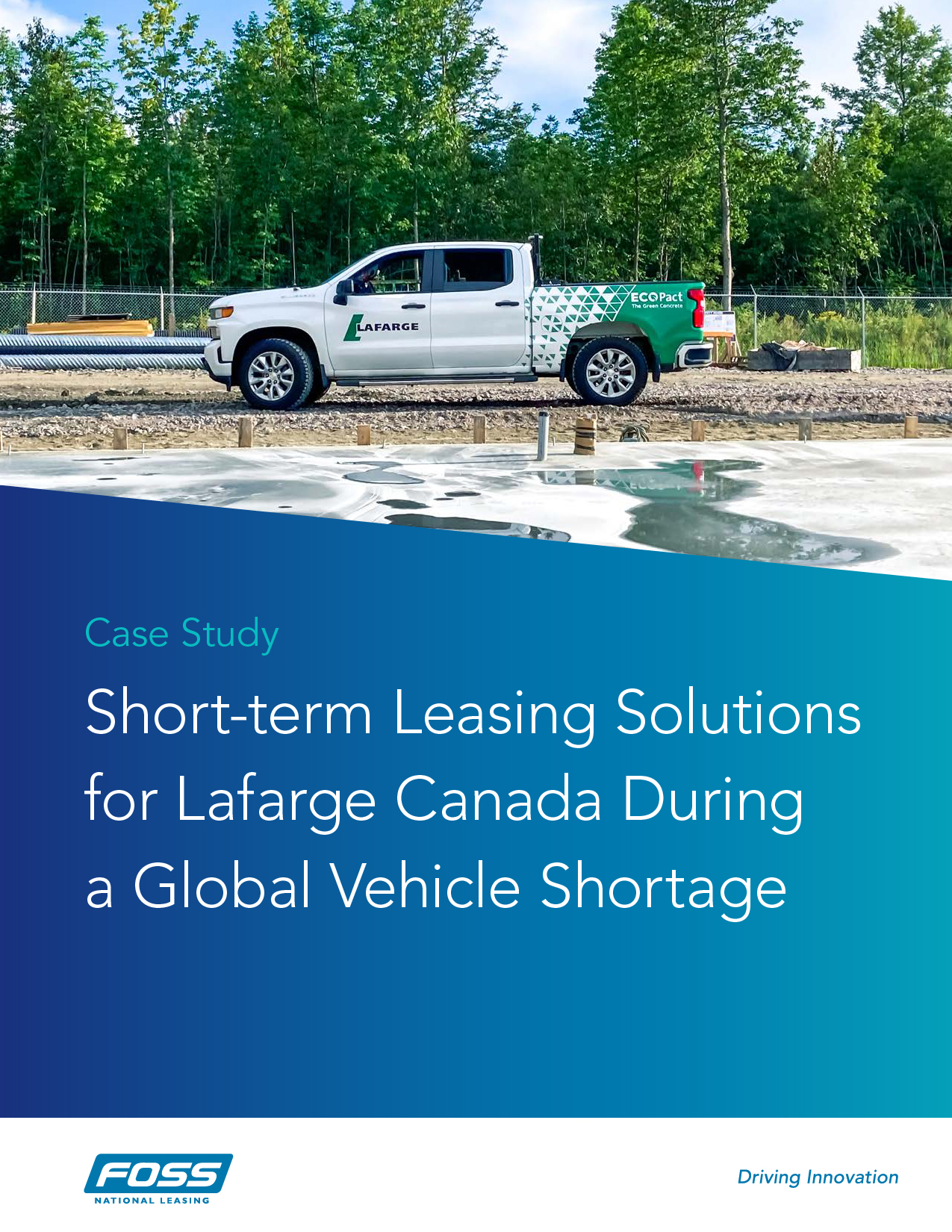
In the dynamic world of fleet management, staying ahead of emerging trends is vital for strategic planning. As we look towards 2024, we've identified some significant factors impacting the industry landscape. Let's dive into these trends to equip you with the insights needed to prepare your fleet for the upcoming challenges and opportunities.
The Evolving Landscape of Zero Emission Vehicle (ZEV) Integration
Adoption with Caution
Zero Emission Vehicles (ZEVs) are gradually finding their place in fleet management. In the coming year, there will be a larger volume of vehicles, with more models suited for fleets. However, implementing zero-emission fleets needs to be considered in-depth as they require planning and thoughtful consideration.
Challenges and Key Considerations
Despite the growing availability of ZEVs, fleet managers face hurdles such as the higher acquisition cost compared to Internal Combustion Engine (ICE) vehicles. Despite the price factor, make sure to match the operational requirements of the fleet and the capabilities and logistics of electric vehicles. Do you need a vehicle that will not drop range in the winter? Do you need a vehicle that will not be able to access charging infrastructure easily?
The need for more charging infrastructure also impacts the apprehension surrounding ZEV adoption. In their current state, public charging networks cannot adequately support the increase in electric vehicles. Regional nuances play a decisive role in shaping the appeal of ZEVs. The attractiveness of electric vehicles is amplified in regions like Quebec or BC, where favourable concessions and rebates exist. Conversely, fleets opt for a more cautious approach in areas like Ontario or Alberta, where incentives may be less compelling.

Total Cost of Ownership and Lifecycle Considerations
A comprehensive evaluation of the entire life cycle and total cost of ownership is imperative when contemplating ZEV integration. The uncertainties, especially regarding residual values and the used car market for electric vehicles, necessitate a strategic approach. Fleet management companies, like Foss National Leasing, can play a helpful role in bridging the gap between manufacturers and customers, prioritizing the selection of vehicles that align with each company's unique needs, remaining brand and drive train agnostic.
Data-Driven Decision-Making for Sustainability
Fleets are urged to align with sustainability goals and embrace the future of green fleet technology. With CO2 emissions reaching unprecedented levels and transportation significantly contributing to greenhouse gas emissions, tracking emissions has become imperative and often mandated. ESG investors are now demanding action, and there is a heightened focus on reporting CO2 outputs. Transparency about the status of current emissions and future goals defines leadership and accountability. Employers also recognize the impact of these decisions on employee retention and recruitment. Companies are diversifying their approaches beyond electric vehicles, integrating hybrid models and mixed fleets while monitoring overall utilization and engine sizes on ICE vehicles. Policies such as reducing idling further contribute to the overarching goal of reducing CO2 emissions.
Positive Momentum and Future Projections
Despite challenges, the fleet industry shows positive momentum in adopting clean technology. Many fleets opt for hybrid vehicles or have a mix of EVs and ICE vehicles. Major fleet operators are still committed to reaching decarbonization targets, with over 50 percent aiming for fully carbon-free fleets by 2027.
Harnessing AI for Enhanced Fleet Management: A Data-Driven Revolution
We’re becoming a data-focused culture and this appetite for information is extending into the fleet world in a material way, enabling increased efficiency and optimization.
AI significantly impacts predictive maintenance, allowing fleet managers to anticipate and address potential issues before they escalate. This data-driven approach enhances vehicle reliability and minimizes downtime, reducing operational costs.
Route optimization also leverages historical data and real-time information to streamline routes for maximum efficiency. This saves time and contributes to fuel efficiency, reducing operating expenses. Telematics devices and AI enhance driver safety by analyzing data to provide constructive feedback on driving behaviours and route utilization. This data-driven approach allows for targeted safety measures and proactive risk mitigation.

AI-Powered Fleet Cards for Detailed Analytics
Unlike conventional payment cards, dedicated fleet cards, such as the Foss National card, are designed explicitly with AI capabilities from the ground up. This ensures detailed analytics and a higher level of fraud prevention. The AI embedded in the fleet card allows for a nuanced understanding of user behaviour, enabling the swift detection of exceptions and mitigating fraud or misuse.
Optimizing Fleet Efficiency with Fit-for-Purpose Vehicles
As the cost of vehicles continues to rise, companies are reevaluating their vehicle selection processes, emphasizing the need for fit-for-purpose vehicles. Companies are exploring alternatives to larger vehicles, considering smaller pickups or compact SUVs to reduce capital costs, downsize engine specifications, and increase fuel efficiency. Customization is critical, ensuring each vehicle aligns with the unique requirements of the fleet. There’s a focus on obtaining customized vehicles that seamlessly integrate into the fleet's operational ecosystem. Specialized equipment and branding contribute to a cohesive fleet identity.
Financial Benefits of Leasing: Tax Efficiency and Flexibility
Despite higher interest rates, leasing vehicles for fleets persists. Market-driven interest rates and depreciation based on use and term make leased vehicles more affordable, offering a compelling alternative to traditional acquisition models. Leasing can also provide tax benefits and flexibility in selecting additional features based on project or seasonal needs. The ease of adapting leased vehicles contrasts with the complexities of purchasing. Leasing allows for optimized vehicle utilization during peak operational periods, eliminating the burden of year-round ownership and associated costs. Finding the right vehicle for your fleet when you need a short-term vehicle is possible through leasing.
Anticipating Supply Chain Normalization in 2024
As we set our sights on 2024, we expect to see the normalization in the automotive supply chain. The disruptions of recent years are poised to change, promising increased vehicle availability. The normalization in the supply chain is set to impact the used car market profoundly. The scarcity-driven surge in used car prices is expected to undergo a correction as the availability of new vehicles increases. A significant consequence will also be a change in residual vehicle values. The volatility experienced in recent times is expected to give way to a more predictable and stabilized scenario.
Navigating Fleet Management in 2024
From the cautious integration of ZEVs to the impact of AI on predictive maintenance, route optimization, and driver safety, the industry is undergoing changes toward greater efficiency and sustainability.
The emphasis on fit-for-purpose vehicles and the financial benefits of leasing underscore the strategic choices that companies are making in response to the continuous rise in vehicle prices. Flexibility, customization, and data-driven decision-making are becoming integral components of optimizing fleet efficiency.
Increased vehicle availability and the correction in the used car market are expected to bring about stability, benefiting industry stakeholders and consumers. The normalization of residual values further contributes to a more predictable and reliable automotive ecosystem.
By staying ahead of the curve and implementing innovative solutions, organizations can position themselves for success in the face of challenges and capitalize on opportunities for a more efficient, sustainable, and resilient future. Follow our blog for timely and insightful information on optimizing fleet management.
Get to Know the Author
Basil Marcus is the president of Foss National Leasing and LeasePlan Canada. With a lifelong passion for automotive, he journeyed from business development to leading one of Canada's top fleet management companies.
Meet our team






